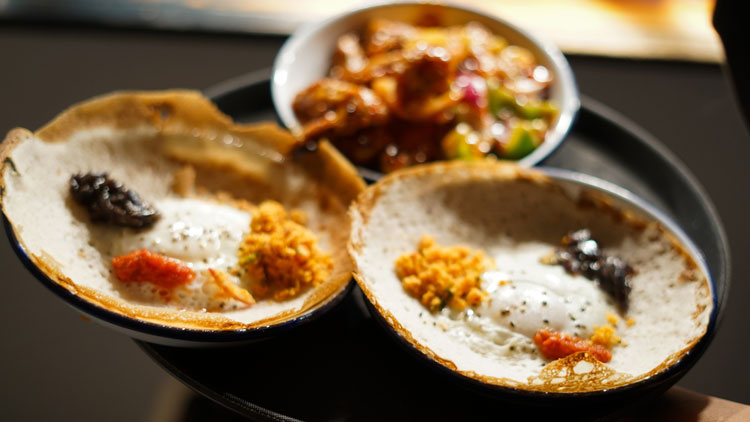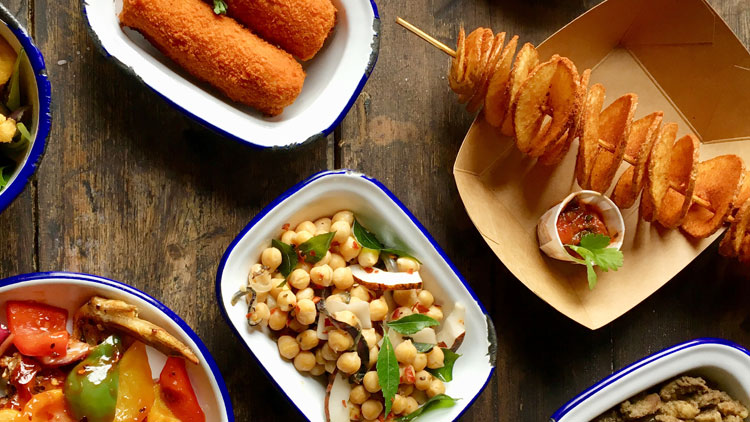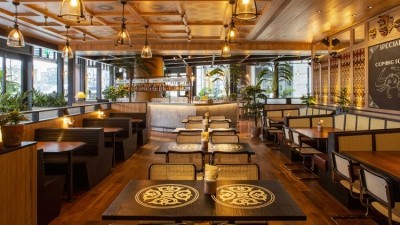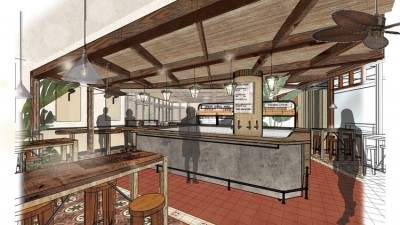The Coconut Tree - the Sri Lankan brand that's laying down roots

The Coconut Tree owes its existence to a quirky rental market in which a pub with a four-bedroom flat on top was cheaper to rent than a house. In December 2016, five Sri Lankan friends took over the St Paul’s Tavern, a rough-and-ready student pub in Cheltenham and, on a shoestring budget, turned it into a Sri Lankan street food restaurant.Thus, what was originally intended to be a hobby – The Coconut Tree only had a tiny domestic kitchen and, initially, the five founders kept their day jobs – has, in barely two years, become a four-strong restaurant business that hopes to build a national presence.
Praveen Thanginah, Dan Fernando and Shamil Fernando oversee the food side of the group and continue to cook in the restaurants, while The Coconut Tree’s board is made up of finance director Mithra Fernando, operations director Rodrigo Rashinthe and brand director Anna Garrod. The latter joined the business shortly after it launched from Cotswolds-based The Lucky Onion group, where she was head of brand and revenue. Her involvement is a coup for The Coconut Tree: prior to The Lucky Onion, Garrod spent the best part of a decade expanding Moroccan-themed bar brand Po Na Na to 65 sites (she left as managing director).
The early days of The Coconut Tree were chaotic, but Garrod – who had worked with Mithra Fernando and Rashinthe at The Lucky Onion – could see straight away that the quintet were on to something with their homely Sri Lankan dishes served in tapas-like portions and an emphasis on cocktails. “After just a few months, it was the top restaurant in Cheltenham on TripAdvisor,” says Garrod. “It was a hit. Nobody has really combined a fun, cocktail-orientated experience with Asian food. It just works.”
The emphasis on the wet side of the business is the key to the brand’s success. Not only is the cocktail-focused drinks offering highly profitable, it also differentiates the brand from provincial Asian-run indies. “We don’t want to be perceived as a curry house,” says Mithra Fernando. “That’s not where we want to be. What we offer is healthier and more varied.”
The current split between food and drink sales is 60:40 and all the sites are A4, meaning that customers can order alcoholic drinks without eating. The business model has similarities with drinks-focused restaurant groups such as Turtle Bay and Las Iguanas, both of which also started out in the south-west.
While Garrod and Fernando acknowledge this, they say it was not intentional. “It’s funny. The businesses certainly do have some similarities but
we didn’t model it on those two brands,” says Fernando. “We know Ajith Jaya-Wickrema (the founder of Turtle Bay and the co-founder of Las Iguanas) and recently did the catering for Turtle Bay’s head office Christmas party. He is Sri Lankan himself and likes what we do.”
Propping up the bar
The Coconut Tree has so far only taken on former pubs and bars. Its second location opened in Oxford a year after the first on the fringes of the city centre in St Clement’s. The brand’s two most recent launches opened less than a month apart late last year and are both located in Bristol – one in indie hot spot Gloucester Road and one in Clifton Triangle.
“The right licence will already be in place and it’s far easier to build up the wet trade in a premises that’s already known as a place to drink,” says Fernando. “The layout is usually better for us too,” interjects Garrod. “There will already be a decent size bar and drinking area. We like that because we can turn our tables without losing customers. We just ask them to move along to the bar.”
Opening these two Bristol restaurants so close to each other – both chronologically and geographically – is an unusual move for such a small group, but The Coconut Tree had found the Bristol licensed property market a tough nut to crack. “We knew we wanted to be in Bristol, even before we signed on Oxford. I know the city well from my Po Na Na days and the demographic is perfect for us.
“We looked for a long time and lost out on a number of sites. It’s hard when you’re a small player in the market and landlords don’t take you too seriously,” says Garrod, who ended up taking a number of property deals to the late stages to guarantee the group a presence in the city. Two good sites came in and, because the five couldn’t pick one or the other, they decided to take them both on. Both are nil premium and rents are manageable, they say.
Informal approach
Formerly Illusions Magic Bar, The Clifton Triangle site is rough around the edges yet characterful with home-made wooden furniture and a mix of whitewashed walls, exposed brickwork and graffiti murals. There are rolls of kitchen paper on the tables à la MEATliquor and tea lights in coconut shells. Almost all the dishes are served in enamel bowls, and plates and cutlery are held in wicker baskets.
The presentation of the menu echoes the thrown-together informality of the restaurant: the double-sided A4 sheet is a sub editor’s nightmare of exclamation marks, capital letters and emojis, and while its style won’t be for everyone, it does give the business a youthful, independent feel.
It also includes explanations for each dish that do a good job of introducing the many unusual ingredients the kitchen uses (including snake gourd, unripe jackfruit and kohlia, a ‘spinous, marshy super-herb’). Key dishes include curries, devilled meat and fish, hoppers and kotthu, a curious street-food dish that sees sliced roti stir-fried with eggs, vegetables and meat. Recipes have largely been sourced from mothers and grandmothers back home, meaning the heat of some of the dishes has had to be reduced to better suit the UK palate, but diners can opt to increase it in most dishes by ordering ‘Sri Lankan-style’.
The limitations at the original Cheltenham site have had a big impact on how food is now prepared and served across all venues. The majority of dishes are prepped beforehand and are simply heated up, and the kitchens also take a street food-style approach with non-core, less popular dishes intended to run out. This is flagged up on the menu in some cases – for example only five portions of ladies fingers (okra) are available each day.
“Our big focus now is consistency. We’re bagging up all the spices and ensuring all the sauces are made the same way across the business,” says Fernando, who, like the rest of The Coconut Tree’s founders, grew up in Sri Lanka.
Organic growth
The Coconut Tree’s cocktail menu is delivered with the help of Diageo Reserve, but some spirits have been sourced directly from Sri Lanka, including arrack, which is distilled from unopened
coconut tree flowers. Served in eclectic receptacles – including hollowed-out pineapples, tiki mugs and porcelain elephants – the selection includes TCT Old Fashioned (bourbon, coconut arrack, chocolate bitters, coconut ice ball; and Cina Colada (tequila, white rum, pineapple, cinnamon, salt).
The unusually interesting drinks menu also includes a selection of soft drinks imported from Sri Lanka – including cream soda, Sri Lankan Sprite and Wood Apple Necta, a strangely delicious concoction that’s somewhere between chocolate milk and tamarind juice – and a well-chosen list of wines that somewhat optimistically tops out with a £150 bottle of Dom Pérignon. The latter extravagance notwithstanding, the group is notably cheaper than other brands in the casual-dining space with many small plates priced under £3 and none above £7 (the group was runner-up in the Best Cheap Eats category of The Observer Food Monthly Awards in 2017). Drinks prices are also competitive: a can of beer is £3 and cocktails start at £5. It is unlikely this pricing model would be sustainable in locations with higher rents, but it’s certainly working at the moment.
The Coconut Tree has so far been able to expand almost completely organically (its property strategy and relatively low fit-out costs have made this a viable option). “We haven’t really borrowed anything. We’ve had to nurture close relationships with suppliers and extended credit terms in some cases. It’s taken a fair bit of juggling, but it works,” says Fernando.
Bringing in investors
“There are lots of people at the top of the business,” adds Garrod. “We need to have a pie that we can split, and bringing in other investors would make that difficult at the moment. Most of the team are young anyway; they don’t want to get out and sell yet. They want a career.”
The group has one site in the pipeline in an as-yet-unnamed location that – reading between the lines – is likely to be within striking distance from the other restaurants but within a new town or city. Bath, Cardiff, Exeter, Reading and Brighton have previously been mooted as possible locations for the brand. “We have a young, multi-cultural team and everyone is having a great time,” says Garrod. “We want to continue to do things well and keep that independent spirit alive.”
Nevertheless, the plan is to grow to 20 sites and eventually bring the brand to London, where Sri Lankan food has more of a presence (JKS Restaurants, the company behind Michein-starred Indian restaurants Gymkhana and Trishna, operates the currently two-strong Hoppers group and there are a fair few independents).
Nobody has quite managed to build a national chain that serves subcontinental food, although a number of businesses – including the mainly northern-based Mowgli – are currently giving it a go.
Sri Lankan food has a lot going for it in that it has enough in common with Indian food so as not to be daunting but has its own identity – and is generally perceived as being more exotic. Could this fast-expanding newcomer be the brand to finally create a truly national subcontinental group?
This is a web version of an article that first appeared in the September issue of Restaurant magazine, the leading title for the UK's restaurant industry. For more features, comment, interviews and in-depth analysis of the restaurant sector subscribe to Restaurant magazine here





































